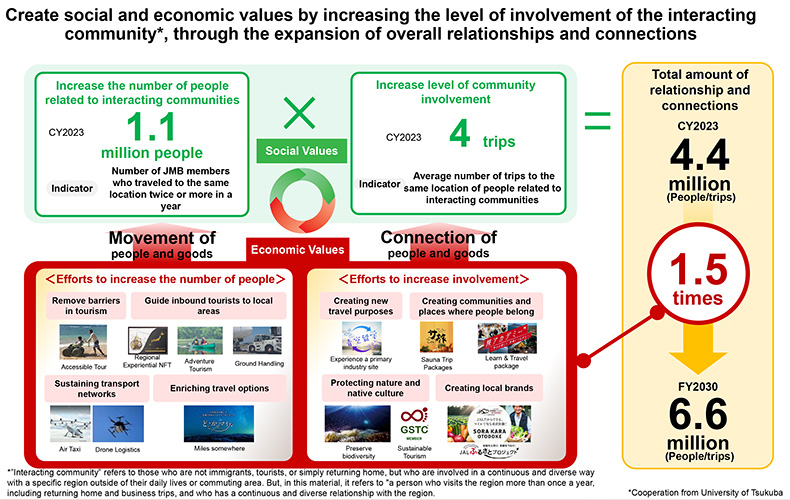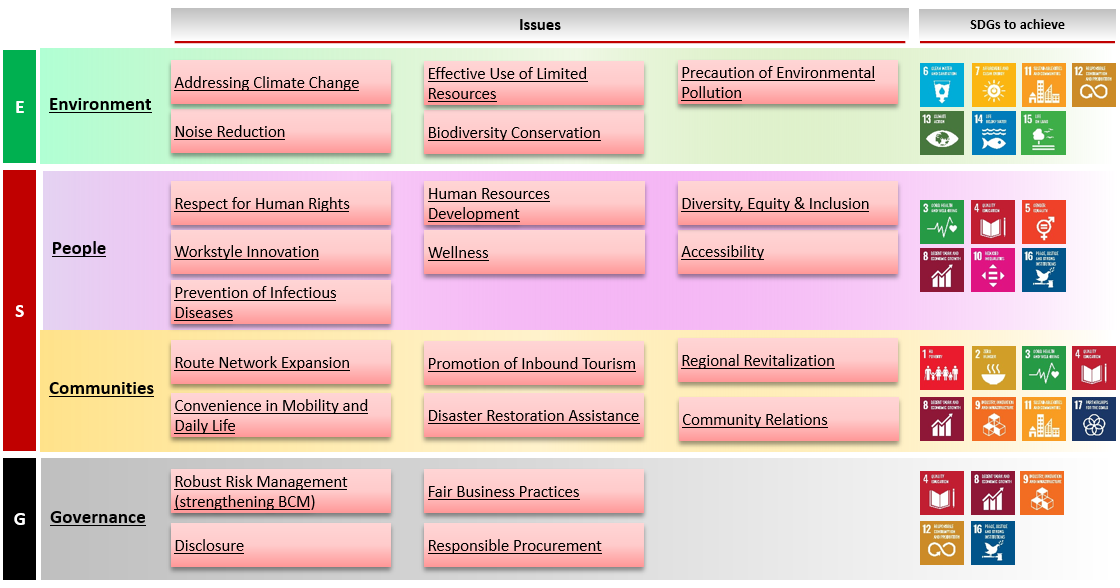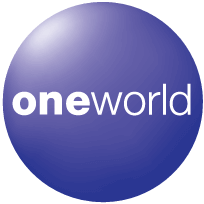JAL Group's Approach to Sustainability
With accelerating globalization and rising interest in ESG and the SDGs, the world is undergoing a period of change in which economic activity itself is impacted by the external environment. In order to realize medium- to long-term growth, the JAL Group has positioned their ESG strategy as the "topmost strategy in order to realize value creation and growth". In other words, the JAL Group has shifted their medium- to long-term growth strategy with value creation as the starting point to achieve their management goals. We will steadily implement their business strategy to promote our ESG strategy and our financial strategy to support their ESG strategy.

The movement of goods and people creates societal connections, and these movements and connections lead to the revitalization of regional economies, thereby solving various social issues and creating social value.
The Rolling Plan 2023 sets out the value creation story of "Create social and economic value by building relationships and connections through air transportation to enhance corporate value". The JAL Group aims to grow into a company that creates relationships and connections in addition to providing safe and secure transportation.

In order to build relationships and connections, the goal is to increase the “total amount of relationships and connections” by 1.5 times vs 2023 by fiscal 2030 by improving the “number of people involved” and the “level of involvement with the community". Specifically, the goal is to increase the number of people by expanding accessible tours and tourism that allow everyone to move freely, and to increase the level of involvement by creating a system to create communities and places where people belong, thereby creating social value such as regional revitalization by increasing relationships and connections and expanding human and commercial flows as well as economic value towards enhancement of the JAL Group's corporate value.

Establishment of Priority Issues in the FY 2021- FY 2025 Medium-Term Management Plan
The JAL Group formulates a Rolling Plan every year to revise and materialize the strategies and plans of the Medium-term Management Plan based on the progress and changes in the environment. Materiality is also reviewed annually. The Medium-Term Management Plan Rolling Plan is discussed and resolved by the Board of Directors.
With the establishment of the Medium-Term Management Plan in FY 2021, we set issues that we will focus on during the Medium-Term Management Plan through the following process.

* Stakeholders: Customers, regional communities, next generation and the environment, business partners, external partners, shareholders and investors, employees
Material Issues Addressed by the JAL Group
We consider our material issues as an opportunity not only to mitigate risks in our corporate and operational activities, but also to accelerate our sustainable growth.
In 2019, the JAL Group defined four areas and 22 issues to be addressed throughout its business. We review our material issues annually, and in 2023, we reviewed them and defined eight new material issues based on changes in the internal and external environment.
The eight material issues are based on the concept of double materiality advocated by international guidelines. We consider not only the impact of society and the environment on our company, but also the impact of our corporate and business activities to the society and the environment.
The new eight material issues were reviewed and signed off at the Board of Directors' meeting on August 1st 2023.


Based on various domestic and international standards, including the Sustainability Accounting Standards Board (SASB) industry-specific accounting standards, industry targets, trends in the international community, and expectations from stakeholders, we identified material issues by determining the degree of impact (risks and opportunities) of our business on society, the degree of impact on our own company, its importance to management, and its importance to external stakeholders. Based on the opinions of related ministries and agencies, academics and experts, NGOs, and other outside experts, the top management has selected four issues as the most important issues during the Medium-term Management Plan and set them as management targets in the Medium-term Management Plan. (Figure 1 and Figure 2)
(Figure 1) Rationale of identification of material issues

(Figure 2) Top issues (management targets of the Medium-term management Plan) and progress

* Although international and domestic airlines account for about 2-3% of global CO2 emissions and emit large amounts of CO2 on their daily flights, the JAL Group contributes to advancing climate change transformation by actively promoting public-private partnerships in the production of SAFs and other activities. Our external environmental impact is calculated to be equivalent to our total CO2 emissions of 9.09 million tons x $51(*1) of carbon, which equals to $463.59 million. We aim to reduce this impact to net zero by 2050.
(*1: According to the U.S. government's calculation, the social cost of carbon emissions is $51/ton-CO2.
Source: https://www.nature.com/articles/s41586-022-05224-9)
* While taking into consideration not to cause overtourism due to a rapid increase in the number of travelers, the JAL Group will revitalize the regions where it interacts with through “relationships and societal connections” created by transporting people and goods, thereby contributing to the revitalization of the local economy and society. The JAL Group will contribute to the revitalization of local economies and societies through the “relationships and societal connections” created by transporting people and goods. Our external social impact is calculated to be equivalent to our total amount of relationships and connections of 4.4 million x JPY 43,995(*2) of per capita consumption of Japanese domestic travelers, which equals to $2200.00 million. We aim to increase this impact to 1.5 times vs 2023 by fiscal 2030.
(*2: According to the report of Japan Tourism Agency, the per capita consumption of Japanese domestic travelers is JPY43,995- Source: https://www.mlit.go.jp/kankocho/content/001724778.pdf)
The reasons for selecting the material issues are described as follows.
Reasons for selecting the most important issues

We also address sustainability-related risks by incorporating them into our company-wide risk management system. For details, refer to Risk Management Process. The relationship between important issues (materiality) and risk management is defined as business risks.

